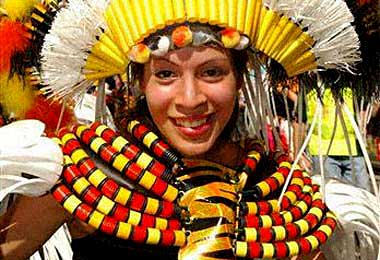All the fun of the carnival degree
But don't be fooled: learning to put on festivals and events is a serious business

Carnivals may look a riot of fun, spontaneity and glamour. But behind the dazzling costumes, the spectacular effects and musical display lie months of hard work, planning and consultation.
"When people go to a carnival or celebratory event, they see something that's fun but it's no less professionally organised for that," says Brigitte Orasinski, artistic director of the Folkestone-based arts company Strange Cargo, which organises carnivals, festivals and lantern processions.
These events, which are celebratory and draw on local participation, are growing in popularity. And it's not just local communities: the corporate world is recognising the power of art and spectacle to connect with its audience.
In response, the University of Kent is launching a new degree programme to help students develop the creative, practical and managerial skills required to put on this kind of live event. The three-year programme, called "Create Events - Design and Production", will start in September 2006, with places for 40 students.
The course will be based at Kent's Medway campus with access to the historic Chatham dockyard, which is the ideal classroom for the budding events organiser. "It's an incredible playground and laboratory for this kind of work," says Gavin Carver, programme director at Kent's School of Drama, Film & Visual Arts. Graduates are likely to work in the growing community arts sector, in inventive corporate performance, in theatre and general events management - or may turn their hands to completely unrelated careers.
"This is a full and proper academic programme," says Carver. "There's a lot of theory behind this."
The entry requirements are 300 Ucas points, with a degree of flexibility for the right candidates. The idea is to attract students from a range of disciplines, including art, media, business and engineering.
Although recruiting from a wide pool of talent, the course will place more weight on the creative aspects of event design. This sets it apart from other events-management programmes, although students may want to check out the BA in arts and events management at the Bournemouth Arts Institute, while Cumbria's Institute of the Arts offers a two-year foundation degree in performances, festivals and events.
But the Kent programme seems to fill a niche, and has been structured to give students maximum exposure to real-life events design and organisation. There are five 12-week projects over the three-year programme.
In the first year, students will be asked to organise a small personal celebration and banquet as an introduction to the nuts and bolts of event design and production, including legal requirements, budgeting, venue management and imaginative design. By the second year, they will be involved in a cultural animation, where they will learn about organising inclusive arts events, construction techniques and the logistics and legalities of public-access works. By year three, they are into experiential marketing, working from a brief and drawing on a range of visual and communication techniques.
"It's a very practical course and they will face real challenges," says Carver. "They will also be working with practitioners, artists and commissioners, so they will be making contacts with relevant people."
This is important. Building a career in the arts isn't easy, and a ready-made contacts book and portfolio is very helpful. "It's very difficult to make a living from just one art form, so artists need to have lots of skills at their disposal and need to be able to turn their hands to lots of different ways of being creative," says Orasinski. "This course at Kent is long overdue. It will equip students for the real world."
This is echoed by Richard Foulkes, special events director at the design and communications consultants The Imagination Group, which is behind high profile branding events for Orange, Coca-Cola, the BBC and Tate Modern.
"Hands-on experience is very important," says Foulkes. "The best creative idea in the world is worthless unless you comprehend the difficulties you will encounter in realising it."
www.kent.ac.uk
www.strange-cargo.org.uk
www.imagination.co.uk
Join our commenting forum
Join thought-provoking conversations, follow other Independent readers and see their replies
Comments
Bookmark popover
Removed from bookmarks